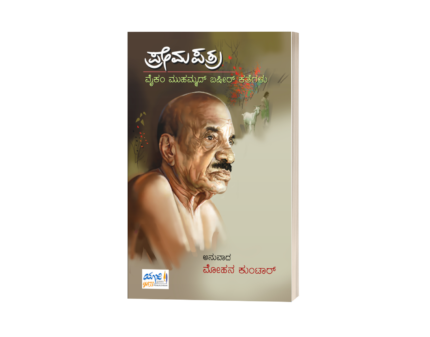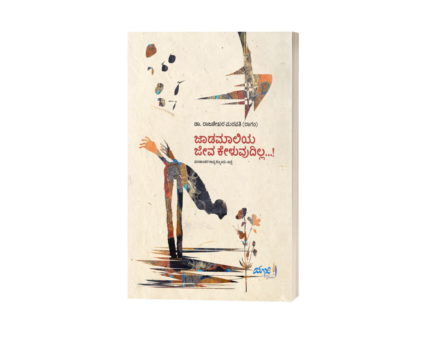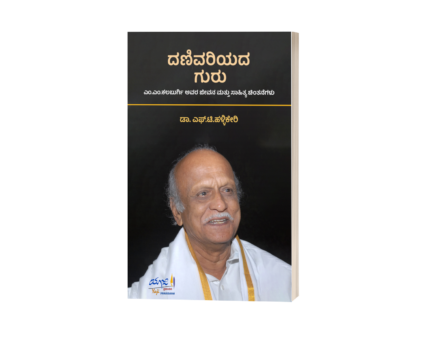PREFACE
Dr. Kavita Kusugal is a young academician who is trying to find her foothold in teaching as well as writing. It, surely, is a good sign considering so few in the field who show readiness to shoulder the responsibility. Most of them have abdicated these twin obligations under some pretext or the other. Some say they are good classroom teachers; others say they are good researchers. There is yet another category of literature teachers who have neither the capacity to teach nor the ability to write. Somehow, they have strayed into this profession; they are mere plodders who ruin generations of students by their lethargy and inaptitude. But this is not the time to bemoan the absence of conscientious teachers who both taught and wrote. Let us celebrate the fact that at least there are some who are keeping the flag flying with their focused approach to their calling. Dr. Kavita, certainly, can be counted among those who are safeguarding the legacy of English teachers at the university level.
Dr. Kavita is a bilingual writer, trying to do justice to both English and Kannada. This bilingual service is a pan-Indian phenomenon. In Karnataka we have a long tradition of English teachers starting from B.M.Shri serving the cause of Kannada. I need hardly furnish the list which traces several decades and touches the present time. Every generation is answerable to the academia and the general public, and expected not to allow the grass to grow under its feet.
Dr. Kavita, not long ago, brought out a collection of poems in Kannada penned by the English M.A. students of her university. That’s an excellent way of building bridges between the literature departments, which have a tendency to “reign in their arrogant parishes”. I had the opportunity to write a Foreword to that collection as well. I don’t know how many of her colleagues appreciated Kavita’s efforts; but she has the stamina to forge ahead with her plans and programmes irrespective of the support or its absence from people with whom she transacts on a daily basis. But her efforts are bound to bear fruits in the long run as she is bridging two cultures. She deserves special thanks for motivating her students in this very laudable endeavour.
With this sketchy preamble, I would like to dwell upon the present collection of short stories originally written in Kannada, by a very distinguished writer of Karnataka, Dr. Sarjoo Katkar, who has been a golden bridge between Kannada and Marathi literatures. Dr. Sarjoo has enriched Kannada literature contributing to it through several genres including translation. His career as a journalist has provided him with a vantage point to observe the momentous happenings in our society. Dr. Sarjoo has always stood for the underdog, the voiceless and the marginalized. His deep devotion to the thinking and philosophy of Baba Saheb Ambedkar has made him one of the very important conscience-keepers of our country.
We need the sturdy voice of the leftist thinkers in India today when it is facing the danger of being muffled and choked by the soulless stridency of the extreme right. Sarjoo has been witnessing the revolutionary march of the marginalized, who have derived strength and inspiration from various sources, especially, in the Seventies of the last century which happens to be a watershed decade for various reasons. That was when the Dalits of Karnataka, as elsewhere, started finding their voice by the emergence of dalit organisations in Karnataka.
This collection of the short stories begins with a story on “Bendigeri Issue”. Bendigeri one of the nondescript villages of Karnataka became a centre of focus because of an incident that shook the conscience of the entire State and, perhaps, its reverberations went beyond our boundaries. Siddharth Kamble, a dalit youth, is the protagonist of this story, who responds to the tragic incident of five Bendigeri youths being made to eat human excreta, just because they happened to carry a few logs of firewood which were lying in the field belonging to the upper caste people. Siddharth is greatly disturbed by this incident. And he tries to reply in his own fashion in his village to this heart-rending incident elsewhere.
The suffering of dalit people regarding drawing water from the well belonging to Savarniyas has been subject of endless discussion in this country. The Dalits go and beg the upper-class people to pour water to their pitchers as they can’t touch the well. So after long struggle the Dalits of this village manage to have a well of their own. Siddharth goes in the dead of the night and relieves himself into the well. Now all those who draw water from that well will willy-nilly touch him, although indirectly. This is how he takes revenge against the Savarniyas who have been so cruel to the Dalits in the village.
At the end, Siddhartha’s mother, being someone belonging to the old order, expresses her fear and suspicion whether he went and touched the Koppadakeri well, meaning the well of the upper-caste people. To which Siddharth answers that he did not touch the well, rather the Koppadakeri people themselves touch him. The readers understand how though the mother fails to read the riddle in Siddharth’s words.
“Dokaribaba” deals with a conman of that name, who has become famous in the village and surrounding places because of his ability to read the people’s future through ‘Anjan’. Dokaribaba had come from Bengal to work in a paper mill. He was always interested in black magic, and witchcraft. So the Sirastedar in Tehsildar’s office Mishrikoti, approaches him to find out the thief when his house was robbed of gold and other valuables.
The narrator is a boy who accompanies Dokaribaba to the graveyard where the Baba collects the material required for his job. The boy also comes to know about the relationship between Baba and a woman called Lakshmi, who is an accomplice in Baba’s experiment. The boy witnesses these two individuals who are stark naked and Baba oozing semen to a glass which Lakshmi drinks. The curious boy hides himself behind the temple and watches the proceedings in the temple.
Fortunately, the narrator joins BA degree course at the Dharwad University and pursues his education. In the meantime, another, more powerful magic man has come from Malayalee land and, as a result, Dokaribaba’s powers become reduced. Eventually, Dokaribaba and his accomplice Lakshmi are found naked and dead near Kalikadevi temple; their genitals being slashed. Nobody knows who did it and for what purpose. They die under mysterious circumstances. The narrator is horrified at this gory sight. One wonders that he is not enabled to tackle this world of superstition even with the aid of his learning and education.
In the story “Taj Mahal”, we have Kamalavva, the protagonist, who is running a tea shop which has a grandiose name called Taj Mahal. In fact Ramachandra can be considered to be the first protagonist as he has developed the art of catching pigeons. He tends pigeons and sells them for money also. People struck by paralysis ask for pigeons and hence it’s a flourishing business as well. He keeps a clutch of young boys in good humour who help him tracing new pigeons in the neighbourhood and catches them with the help of his pigeons.
Kamalavva’s mother was seduced by a policeman who visited the village and thus Kamalavva has been his gift. The village headman’s son Appanna Gouda developed friendship with Kamalavva and Appanna’s people find out both of them missing in the village. On their return, they warn her that she should never be seen with Appanna again. Kamalavva entices her old friend Basappa and both of them beat up the lame Ramachandra who believes in Kamalavva’s promise that she would marry him only to be deceived in a shocking way.
In “Lakka” we find a young boy of that name who is taken away to Mumbai from his village by the well to do couple. Lakka’s father is working in a mill. The physician in the mill happens to be madam’s brother. So the matter is settled. Lakka’s father requests the saheb to continue his education in the big city. The couple readily promise, but the situation in the household is completely different. Lakka has to take care of the saheb’s children, Arun and Smita, who are school-going siblings. He begins to worry that no one is bothered to put him into a school even after the lapse of three months. When he encounters gruelling routine at the sahib’s house without any hope of pursuing his education, he seeks Ganapath’s advice as to how to wriggle out of the situation. Ganapath is neighbour house Sharma’s domestic help. He comes out with an excellent suggestion and accordingly Lakka breaks the TV screen while cleaning it. The sahibs become furious and at once they decide to get rid of Lakka. Lakka is happy that his plan bore fruit. On reaching his village the thing that brings happiness is the sight of his school. It’s the evening and all the children are moving towards their houses after the school hours. Lakka imagines that they would all sing ‘Janaganamana’, the national anthem, in the morning; he also starts crooning it in advance. Lakka is happy to join his parents who may not have enough to eat, but there is no short supply in their love. Thus, the story ends.
“Coolie” discusses the difference in meaning of the words ‘coolie’ and ‘reward’. The owner of a house remains apathetic to a wall painter when the latter asks for the reward for painting his compound wall. So the painter goes away. The next day he returns and destroys the painting with an axe and asks the man to punish him. Then also the man remains unperturbed. But this time the painter asks for his coolie. The man thinks that ‘reward’ and ‘coolie’ are the same. But he expected the painter to ask for his coolie the previous day instead terming it as reward. All the same today he is happy to give coolie to the painter in the form of his dog. So saying he loosens the noose around the dog and the story ends.
The story “Murder” deals with a murder mystery. Vinay is the protagonist who encounters a man with an ugly face in the park. A young and beautiful lady is sitting close by and Vinay becomes suspicious of the ugly man and therefore keeps an eye on him as there is a very good-looking young lady in the vicinity. The young lady is continuously weeping and wiping her tears all the time. Vinay approaches her and enquires her about her problem. She says, she has been cheated by her lover and cries inconsolably. Subsequently, she requests him to accompany her to her apartment which was nearby. Vinay obliges and that ugly man is stalking them all along. After Kate (that’s her name) and Vinay enter the apartment, she undresses completely and indulges in sexual act. Vinay is completely overcome by her advances and even before he realises whether the whole thing was taking place in a dream or it is real, she stabs him several times and tries to kill him.
The town had seen umpteen number of murders taking place in the recent past. So, Vinay is worried about the spate of murders. With that botheration he was suspecting the ugly man who was eyeing the young lady. But it is such a dramatic irony that this young lady herself becomes the murderer and the ugly man appears at the end with two police men who enter the apartment by forcefully opening the door. They apprehend the young lady.
“Lottery” is a story that is a product of digital world, which promises a fabulous amount of 5 lakh pounds as lottery. Though the narrator is not at all interested either in lottery or in gambling, willy-nilly he is sucked into the vortex. With the help of his friend, Tushar, he finds out that it’s all the machination of a terrorist group which bamboozles unsuspecting innocent people and suck their money. Thus, he learns a lesson of his life.
Finally, he receives a message from his daughter and this becomes a source of joy and serenity to the narrator as he is able to regain his mental balance which had been disturbed untoward thoughts of making money in an illicit and immoral way.
“The Leader” holds mirror to the contemporary society where leaders are born in every village, every town and every mohalla at regular intervals in order to fill the vacuum left by good people. They masquerade as do-gooders though their intentions are always bad and evil. Thus, we have a leader in this story, who, in the guise of helping Ramanath, the proprietor of a small bakery, tries to exploit him completely. He becomes close to the family so much so that one day he declares that he is going to marry Ramanath’s daughter as he had also benefited the family in establishing a shop for Deepak, their son. Sunita, the daughter is married off to him and the leader keeps an eye on Anita, the younger sister, and says he would marry her also – thus they could save the expenditure. He demands the amount apportioned for Anita’s wedding. This is the last straw on the camel’s back. Ramanath’s patience is tried to the maximum extent; therefore, in a bit of rage he pierces the leader’s stomach with a sharp knife kept in the bakery. Ramanath seems to have done his duty as a self-respecting father who cannot be expected to remain a bystander when the riff-raff is violating the modesty of his second daughter also.
The author is capable of scathing political satire is borne out in the story “Transcendence”, where we witness all the sordid drama of contemporary politics playing out itself involving the chief minister, a textile owner and the filthy lucre that is the bone of contention. Mangeelal had come from Rajasthan and has established a textile mill. There is a strike by the mill workers regarding the rising of the wages. When the strike drags on the CM play-acts to work out a plan and to be a mediator to settle the dispute for that he demands five crore of rupees, whereas the mill-owner sends a brief case containing one crore through his lawyer. The CM refuses to accept one fifth of what he had demanded. But, right from the beginning, we have his primary school teacher Ganachari guru, shadowing him all along. At this point he appears like an apparition and takes the CM into task and only the latter experiences the beatings of his teacher for throwing all his instructions to the wind. The CM’s PS is shocked and surprised that the Saheb has fallen on the ground and pleading his invisible teacher not to beat him further and promising him that he would mend his ways.
After this incident, addressing the gathering, the CM speaks the truth and admits to his taking bribe and admonishes his followers to follow the correct path abjuring all illicit, illegal, and corrupt means.The story ends with the fleeting appearance of his teacher, Ganachari guru, expressing his happiness that he, being his student, passed the examination and declares that ‘I am very proud of you’.
Dr. Sarjoo Katkar has made each and every story equally interesting in this collection by focusing his attention on the singular traits of his characters. For example, in “Charles Sobhraj”, the notorious conman is portrayed as extremely gifted. But if only he had made use of his extraordinary brilliance to good purpose, he would have served the society and mitigated its sufferings. But, unfortunately, he was not cut out for that. Nobody should dream of becoming invisible after stealing people’s properties like cars and other things. He escaped from the jails several times. His eyes were the chief source of his attraction and many women fell for him because of his eyes. Charles Sobhraj hogged the limelight for decades, for wrong reasons. If only he had good chromosomes in his blood he could have left the world in a better shape than he found it.
The protagonist Maddeppa, in the story of the same name, is a village bumpkin, who goes to Goa by chance accompanying Abdulla, the truck cleaner and Siraj, the driver. In Goa, he looks around and finds the life there immensely liveable than in his village where he had put up with insults by his elder brother and his family. Again, by chance, he extends a helping hand to Christina, a foreign lady, who falls while she was negotiating her boat-ballon. Maddeppa is an adept at massaging, the art he had mastered in his village. That comes handy. Christina takes him to her cottage and asks him to massage further. Thus, they achieve intimacy and eventual sexual union. For some time, they live like husband and wife. Christina insists him to take her to his village, which he obliges. Christina now becomes Krishnavva and becomes completely assimilated with the village life. She also teaches English in the village school besides guiding women in other in useful works.
Krishnavva is absolutely happy in her new environment and new family. The author has given the message that unalloyed innocence of a person is bound to reward him eventually. People of Maddeppa’s age in the village feel jealous of his good luck that he has brought a white foreigner as his wife. All said and done, Christina, now Krishnavva, is an enlightened woman who accepts Maddeppa and his milieu as her own and leads an unruffled life.
All the fourteen short stories in this anthology are highly readable. Each one tries to provide an insider view of the world it portrays. The dominant sentiment, of course, in them, is the plea for enlightenment and the removal of discrimination. The author is against superstition, as it sucks the very vitality of human energy directing it to wasteful tributaries. The emphasis is on disciplined living; without it societies experience enervating forces which leave them devastated converting individuals into flotsam and jetsam on the mere stream of life.
Education is of utmost importance. That is a real ‘Anjana’ and not the ‘Anjana’ proffered by the Babas and the conmen. Education leads individuals to sure shore of enlightenment and that enables the entire society to rise to a higher order of living; otherwise we will wallow in darkness and miasma.
What kind of money is desirable – the money that we earn by the sweat of our brows and not the lottery money. Easy money is inherently immoral and any tendency to earn it should be nipped in the bud for restoring balance and establishing tranquillity. What kind of leaders do we want? We want leaders who are tried and tested in the fire of life; who have a goal to achieve the prosperity and well-being of the society. We don’t want leaders without moral rectitude – because our Founding Fathers have given us the bench-mark and anything less than that will be an anathema. But unfortunately, the leaders of today lack not only idealism and ideals, they are simply bereft of lasting values.
The primary school teacher appears in one of the stories(Transcendence) as a reference point and the chief minister shudders before his apparition as he deviated from the path professed by the teacher. It has a great lesson for all of us. The teachers must possess the integrity that is a great weapon against all distractions. Similarly, the politicians must also have a high degree of sensitivity to recover the lost balance as they are meant to serve the society.
I am sure, these stories will prick the conscience of the readers as they are expected to do. My heartfelt congratulations to both Dr. Sarjoo Katkar, the distinguished author, and the translator, Dr. Kavita Kusugal, for giving this anthology. Kavita’s pen will improve as she goes along. She is known for her perseverance and as the saying goes “Hard work never kills”. My best wishes to her.
-Dr. C. Naganna Visiting Professor
University of Mysore, Mysore
Translator’s Note
Reading Dr. Sarjoo Katkar’s stories is in a way taking a journey of his world of experience. His two anthologies of stories ‘Ateeta’ and ‘Vruttanta’ contain stories that are so different from each other. Some give messages to life and society. The others reflect the issues in society picturesquely.
Dr. Sarjoo Katkar’s world of experience is so vivid and rich that the readers would love to have a tour of it. The skilled expression makes the readers feel it their own experience. Dr. Katkar said, he has written them around 20 years ago. But the stories are so relevant even today, that the reader definitely feels that he is reading the stories of present day society.
The canvas of his stories is vast. He covers issues related to ethics in politics, corruption in the administrative system, cultural and villainous world, cyber crime, Youth in lost way, the effects of superstitions, evils of caste system, child labour and the benefits of education, love and sex, hypocrisy and exploitation of the poor.
So many stories are inspired by the actual happenings. Dokaribaba, Charles Sobhraj, Maddeppa are all part of history. The book will definitely help to understand the life and the society. The stories reveal Dr. Katkar’s boldness in his presentation and his sharp witted observation. His narration is real and picturesque.
It is his greatness that he gave me this assignment of translating his stories. There are so many people who wish to translate his works. As I have seen since my childhood his encouragement and motivation to the youngsters has no limit. He is a reason for the development of a generation of writers. I have admired and considered him as a model in poetry, story and novel writing. There is no field of literature where he has not tried his hand. He has a record of his own in journalism and in literature.
Translating his work is an experience of new learning. It is of course a challenging task. The language of Dr. Sarjoo Katkar is an epitome of native culture. The Kannada language of Belagavi is unique in itself. As a border place and a city of cantonment area we can see the shades of different cultures and languages in the life of Belagavites. The same is visible in the language and the subject matter of stories of Dr. Katkar. Translation doesn’t happen only with language. It is translating cultures as well. And this is where translating Dr. Katkar is a challenge.
He uses words which come out of the native soil. In ‘Leader’ the leader’s rudeness and the innocence and helplessness of Ramanath’s family, the language of careless youth are very common. As Wordsworth turns natural into supernatural, Dr. Katkar takes stories of every day and makes them monumental stories in literature. It is his style which matters. He narrates so dearly that one feels as to give ears to his narration. There are some local usages in the stories which have no parallels in English language. Or the similar usage in the targeted language doesn’t carry the cultural potentiality of the source language usage. A few examples to mention here are, the word usages like ‘Melina Bavi’, and ‘Kelagina Bavi’ are not merely upper well and lower well. With generations and after years of usage they become idiomatic. They indicate the hierarchy in the name of caste. ‘Rotti’, doesn’t have any equal word in English. ‘mantra’, ‘kumkum’, ‘arishina’, ‘churumari’, ‘bendu-bettas’, ‘jawari’, ‘panchas’, ‘pinda’, ‘padmasan’, ‘angara’, ‘mandala’, ‘linga’, ‘lungi’, ‘anjan’, like-wise the list grows on. Dr. Sarjoo Katkar has used so many idioms and phrases which have native colour. Keeping in mind the non-Kannada readers, wherever it is necessary a glossary of local words is given at the end of the stories. This work of translation gives the taste of native language and culture. And a world full of variety of experience. And thus the work is unique.
Prof. C. Naganna, a well-known translator and writer happily wrote an appropriate preface to this translated work and also suggested changes in some words. I have incorporated the changes instructed by Prof. C. Naganna. I must be indebted to him, for he has spared his valuable time and guided me. And I have no words to express my gratitude to Dr. Sarjoo Katkar for giving me this opportunity to translate his stories. I must record my gratitude to Prof. M. Ramachandra Gowda, Honorable Vice-chancellor of Rani Channamma University, Belagavi, Prof. Basavaraj Padmashali, the Registrar of the University, Dr. M. Jayappa Special Officer Rani Channamma University, Belagavi, Prof. V.F. Nagannawar, the Chairman of the Department of Studies in English and my dear colleagues Dr. Nagaratna Parande, Ms. Pooja Halyal, Dr. Madhushri Kallimani, and Dr. Fayyaz Ilkal for their support and encouragement.
-Dr. Kavita Kusugal
Rani Channamma University, Belagavi
Index
- Preface / 5
- Translator’s Note / 16
- The Chapter after Bendigeri Issue / 21
- Dokaribaba / 34
- Taj Mahal / 48
- Lakka / 59
- Coolie / 65
- Murder / 70
- Lottery / 76
- The Leader / 83
- Nooky / 92
- Criminal / 96
- Transcendence / 104
- Charles Sobhraj / 116
- Divisional Commissioner and his Domestic Buffalo / 128
- Maddeppa / 137
 Our Books
Our Books













Reviews
There are no reviews yet.